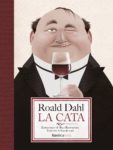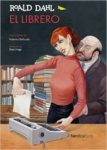Sections: Information | Plot Description | Teacher Ideas
Information
- First published:
- April 1958 issue of Esquire
- Connections:
- Shares characters with “Ah, Sweet Mystery of Life,” “Mr. Hoddy,” “Mr. Feasey,” “Rummins,” and “The Ratcatcher” (collectively known as the “Claud’s Dog” series from Someone Like You), as well as “The Champion of the World.”
- Protagonist shares a name with one of the farmers in Fantastic Mr. Fox.
- Related books:
- 5 Bestsellers Including Over 40 Tales of the Unexpected
- Ah, Sweet Mystery of Life
- Completely Unexpected Tales
- Deception
- Fireside Reader: A Treasury of Outstanding Short Stories from Reader’s Digest
- Great British Short Stories
- Kiss Kiss
- Lamb to the Slaughter and Other Stories
- Selected Stories of Roald Dahl
- Tales For Travellers (Vol. 1)
- Tales of the Unexpected
- Tales of the Unexpected (Volume 1)
- The Best of Roald Dahl
- The Collected Short Stories of Roald Dahl
- The Complete Short Stories: Volume Two
- The Great Automatic Grammatizator and Other Stories
- The Umbrella Man and Other Stories
- Magazine publications:
- Movies:
- Des Pfarrers Freude (TV movie - 1966)
- Audio Books:
- “Parson’s Pleasure” read by Derek Jacobi
- Kiss Kiss read by Tamsin Greig, Juliet Stevenson, Adrian Scarborough, Stephanie Beacham, Derek Jacobi, Stephen Mangan
- Nerz Und Masche read by full cast
- Tales of the Unexpected read by Geoffrey Palmer, Joanna David, Tom Hollander, Patricia Routledge, and Joanna Lumley
- TV Shows:
- Tales of the Unexpected (1979)
- Thirty-Minute Theatre (1965)
Plot Description
Spoiler warning! Mr. Cyril Boggis is an antiques dealer in Chelsea, London. He doesn’t have a large shop, but he still manages to make a tidy income each year by buying the most remarkable pieces of furniture at very, very cheap prices and selling them for immense profits. His friends in the trade wonder where he finds such rare items so regularly. It turns out that Mr. Boggis’s scheme is rather simple: he dresses up as a clergyman and visits English farmhouses under the pretenses of writing articles for the Society for the Preservation of Rare Furniture. When he finds something valuable, he makes the person an offer and then sells the item in his shop for twenty times as much. On this particular trip he’s canvassing the county of Buckinghamshire and comes across three locals (Claud, Bert, and Rummins) near a dirty, ramshackle farmhouse. Once he convinces them to let him inside, he is flabbergasted to see a Chippendale Commode standing in the living room. The Commodes were made by the famous 18th-century furniture maker Thomas Chippendale, and only three others were known to be in existence. Boggis nearly faints when he realizes that this piece could fetch up to twenty thousand pounds in an auction. He recovers, though, and mentions that he needs a new set of legs for a table he has at home. The ones on the commode, he says, would just fit. Rummins is doubtful, and so Boggis cons him into thinking that the piece is simply a worthless Victorian reproduction. He finally ends up purchasing the commode for the grand total of twenty pounds. After he leaves to get his car, the three men decide to help him out by cutting the legs off for him. Rummins also speculates that the parson might back out of the deal if he can’t fit the entire piece into his car (he doesn’t know that Boggis has a station wagon), so Claud takes an axe and breaks the commode to pieces. “I’ll tell you one thing,” he says. “That was a bloody good carpenter put this job together and I don’t care what the parson says.” At that moment, Mr. Boggis drives up in his car.
Teacher Ideas
- “Parson’s Pleasure” – Classroom Activities
- Includes a number of questions and exercises pertaining to the story


